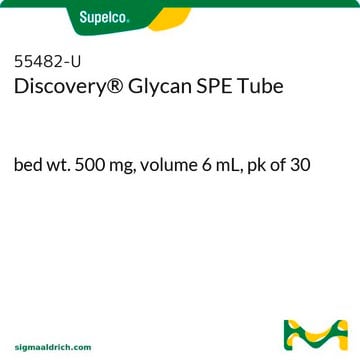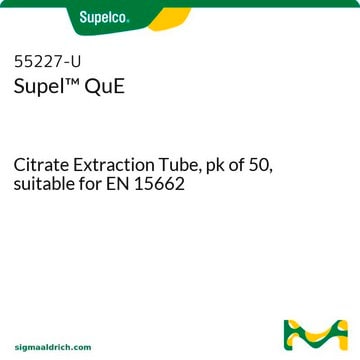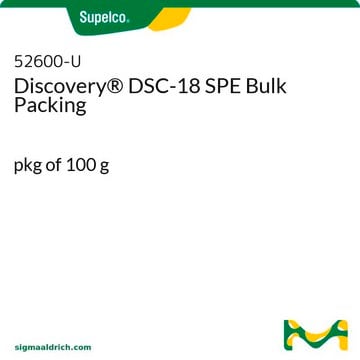55467-U
Discovery® Glycan solid phase extraction (SPE) Cartridge
bed wt. 250 mg, volume 3 mL, pk of 54
About This Item
Recommended Products
Product Name
Discovery® Glycan SPE Tube, bed wt. 250 mg, volume 3 mL, pk of 54
material
PE frit
polypropylene
Quality Level
composition
bed wt., 250 mg
packaging
pk of 54
technique(s)
solid phase extraction (SPE): suitable
volume
3 mL
impurities
<5% Water content
matrix
polyamide resin base material
matrix active group
amide, poly- phase
particle size
50-160 μm
pH range
4.5-7.5(surface pH)
bulk density
0.2‑0.3 g/mL
separation technique
reversed phase
Looking for similar products? Visit Product Comparison Guide
General description
Sample Matrix Compatibility: Aqueous or methanolic solutions
- Polyamide Resin: Particle Size: 50-160 μm, Surf pH: 4.5-7.5, Density: 0.2-0.3 cm3/g, Water Content: < 5 %
- Useful for extracting gylcans from aqueous solutions.
- Used to adsorb polar compounds (-OH groups, esp. phenolic compounds) from aqueous or methanolic solutions under the reversed-phase mechanism through strong hydrogen bonding between compound hydroxyl groups and amide groups of the resin
- Also may be used for the extraction of tannins, chlorophyll, humic acid, pharmacologically active terpenoids, flavanoids, gallic acid, catechol A, protocatechuic acid, phloroglucinol, aromatic carboxylic acids, and nitroaromatic compounds
- Irreversibly retains quinones.
Legal Information
Storage Class Code
11 - Combustible Solids
WGK
WGK 3
Flash Point(F)
Not applicable
Flash Point(C)
Not applicable
Choose from one of the most recent versions:
Certificates of Analysis (COA)
Don't see the Right Version?
If you require a particular version, you can look up a specific certificate by the Lot or Batch number.
Already Own This Product?
Find documentation for the products that you have recently purchased in the Document Library.
Articles
Reversed-phase interaction will retain most molecules with hydrophobic character; it is very useful for extracting analytes that are very diverse in structure within the same sample.
Our team of scientists has experience in all areas of research including Life Science, Material Science, Chemical Synthesis, Chromatography, Analytical and many others.
Contact Technical Service







